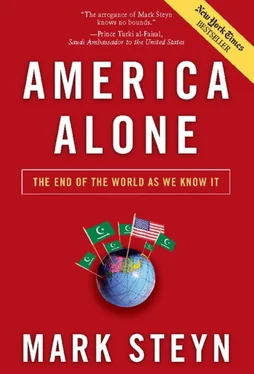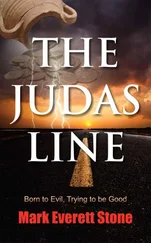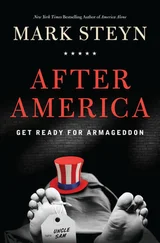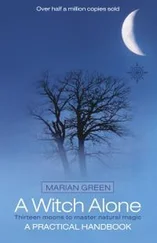Compare Mr. Inyadullah with the acclaimed London novelist Margaret Drabble, also speaking in the Daily Telegraph, just after the Iraq war. She feels the same way, at least about carbonated beverages: “I detest Coca Cola, I detest burgers, I detest sentimental and violent Hollywood movies that tell lies about history. I detest American imperialism, American infantilism, and American triumphalism about victories it didn’t even win.” Look at Ms. Drabble’s list of grievances. If you lived in Poland in the 1930s, you weren’t worried about the Soviets’ taste in soft drinks or sentimental Third Reich movies. America is the most benign hegemon in history: it’s the world’s first non-imperial superpower and, at the dawn of the American moment, it chose to set itself up as a kind of geopolitical sugar daddy. By picking up the tab for Europe’s defense, it hoped to prevent those countries lapsing into traditional power rivalries. Nice idea. But it also absolved them of the traditional responsibilities of nationhood, turning the alliance into a dysfunctional sitcom family, with one grown-up presiding over a brood of whiny teenagers — albeit (demographically) the world’s wrinkliest teenagers. America’s preference for diluting its power within the UN and other organs of an embryo world government has not won it friends. All dominant powers are hated — Britain was, and Rome — but they’re usually hated for the right reasons. America is hated for every reason. The fanatical Muslims despise America because it’s all lap-dancing and gay porn; the secular Europeans despise America because it’s all born-again Christians hung up on abortion; the anti-Semites despise America because it’s controlled by Jews. Too Jewish, too Christian, too godless, America is George Orwell’s Room 101: whatever your bugbear you will find it therein; whatever you’re against, America is the prime example of it. That’s one reason why its disparagers have embraced environmentalism. If Washington were a conventional great power, the intellectual class would be arguing that the United States is a threat to France or India or Gabon or some such. But because it’s so obviously not that kind of power the world has had to concoct a thesis that the hyperpower is a threat not merely to this or that rinky-dink nation state but to the entire planet, if not the entire galaxy. “We are,” warns Al Gore portentously, “altering the balance of energy between our planet and the rest of the universe.”
Think globally, act lunarly. The “balance of energy” between Earth and “the rest of the universe”? You wouldn’t happen to have the statistical evidence for that, would you?
Universal “balance of energy” graphs for 1940 and 1873? Heigh-ho. America is a threat not because of conventional great-power designs, but because — even scarier — of its “consumption,” its way of life. Those Drabble-detested Cokes and burgers are straining the Earth in ways that straightforward genocidal conquerors like Hitler and Stalin could only have dreamed of. The construct of this fantasy is very revealing about how unthreatening America is.
But others cast the hyperpower’s geniality in a different light. Visitors to America often remark on that popular T-shirt slogan usually found below a bold Stars and Stripes: “These Colors Don’t Run.” To non-Americans, it can seem a trifle touchy. But for a quarter century the presumption of the country’s enemies was that those colors did run — they ran from Vietnam, they ran from the downed choppers in the Iranian desert, they ran from Somalia. Even the successful campaigns — the inconclusively concluded 1991 Gulf War and the aironly 1999 Kosovo war — seemed manifestly designed to avoid putting those colors in the position of having to run. As Osama saw it, those colors ran from the African embassy bombings and the Khobar towers, just as Zarqawi figured those colors would run from the Sunni Triangle. Being seen not to run — or, if you prefer, being seen to show “resolve” — should be the indispensable objective of U.S. foreign policy. Were these colors to run from Iraq, it would be the end of the American era — for why would Russia, China, or even Belgium ever again take seriously a superpower that runs screaming for home at the first pinprick?
Don’t take Osama’s, or Saddam’s, or Mullah Omar’s, or the Chinese politburo’s word for it. Consider those nations who (a) regard themselves as broadly well-disposed toward America and (b) share the view that Islamism represents a critical global security threat, yet (c) have concluded that the United States lacks the will to get the job done. You hear such worries routinely expressed by the political class in India, Singapore, and other emerging nations. The British historian Niall Ferguson talks about “the clay feet of the colossus.” Admiral Yamamoto’s “sleeping giant” has become harder to rouse — the La-Z-Boy recliner’s a lot more comfortable and pampering than the old rocker on the porch. In Vietnam, it took 50,000 deaths to drive the giant away; maybe in the Middle East, it will only take 5,000. And maybe in the next war the giant will give up after 500, or 50, or not bother at all. Our enemies have made a bet — that the West in general and the United States in particular are soft and decadent and have no attention span. America has the advantage of the most powerful army on the face of the planet, but she doesn’t have the stomach for war, so it’s no advantage at all. After all, if you were a typical viewer of CNN International (which makes CNN’s domestic service look like a 24/7 Michael Savage channel), what would have made the biggest impression on you since September 11? That America has the best, biggest, and most technologically advanced military on the planet? Or that the minute you send it anywhere hysterical congressmen are shrieking that we need an “exit strategy”? The corpulent snorer in the La-ZBoy recliner may have a beautifully waxed Ferrari in the garage, but he hates having to take it out on the potholed roads. Still, it looks mighty nice parked in the driveway when he washes it.
If Europe’s dwindling manpower and will are a one-way ticket on the oblivion express, numbers plus will is the most potent combination of all: serious people power. What does it mean when the fastest-growing population on the planet is a group that, to put it at its mildest, has a somewhat fractious relationship with the characteristics of a free society?
Can the developed world get more Muslim in its demographic character without becoming more Muslim in its political character? And what consequences does that have for art and culture, science and medicine, innovation and energy… and basic liberties?
Perhaps the differences will be minimal. In France, the Catholic churches will become mosques; in England, the village pubs will cease serving alcohol; in the Netherlands, the gay nightclubs will close up shop and relocate to San Francisco. But otherwise life will go on much as before. The new Europeans will be observant Muslims instead of post-Christian secularists, but they will still be recognizably European. It will be like Cats after a cast change: same long-running show, new actors. Or maybe the all-black Broadway production of Hello, Dolly! is a better comparison: Pearl Bailey instead of Carol Channing, but the plot, the music, the sets are all the same. The animating principles of advanced societies are so strong that they will thrive, whoever’s at the switch.
But what if it doesn’t work out like that? In the 2005 rankings of Freedom House’s survey of personal liberty and democracy around the world, five of the eight countries with the lowest “freedom” score were Muslim. Of the forty-six Muslim majority nations in the world, only three were free. Of the sixteen nations in which Muslims form between 20 and 50 percent of the population, only another three were ranked as free: Benin, Serbia and Montenegro, and Suriname. It will be interesting to follow France’s fortunes as a fourth member of that group.
Читать дальше












